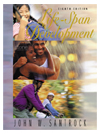 Life-Span Development, 8/e John W. Santrock,
University of Texas - Dallas
Early Childhood Physical and Cognitive Development in Early Childhood
Chapter Outline-
PHYSICAL DEVELOPMENT IN EARLY CHILDHOOD
-
COGNITIVE DEVELOPMENT IN EARLY CHILDHOOD
Piaget’s Preoperational Stage of Development Symbolic Function Substage Intuitive Thought Substage
Vygotsky’s Theory of Development Zone of Proximal Development Scaffolding Language and Thought Evaluating and Comparing Vygotsky’s and Piaget’s Theories Teaching Strategies Based on Vygotsky’s Theory
Information Processing
-
LANGUAGE DEVELOPMENT
-
EARLY CHILDHOOD EDUCATION
The Child-Centered Kindergarten The Montessori Approach Developmentally Appropriate and Inappropriate Practices Does Preschool Matter? Education for Disadvantaged Children
|
| 


 2002 McGraw-Hill Higher Education
2002 McGraw-Hill Higher Education